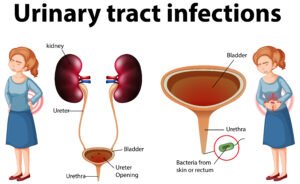Urinary tract infections (UTIs) can cause bloating. Here are 5 ways UTIs can cause bloating, inflammation, fluid retention, gut changes, pelvic discomfort, and systemic effects.
First of all, 5 Ways UTIs Can Cause Bloating—is that true?
Have you ever had a swelling, uncomfortable feeling in your abdomen and wondered what could be the cause? The bloating may be directly associated with a urinary tract infection (UTI).
UTIs are common infections that can cause surprising symptoms like bloating, as well as havoc on other regions of your body in addition to the urinary system. Let’s dive into 5 ways UTIs can cause bloating and what you can do about it.
Urinary Tract Infections Symptoms:
The most common symptoms associated with urinary tract infections include the following:
Bloating
Pain or burning upon urination
The feeling of wanting to urinate constantly
Cloudy, bloody, or strong-smelling urine
Fever
Diarrhea
Nausea
Muscle aches
1. Inflammation: 5 Ways UTIs Can Cause Bloating
Your body naturally produces white blood cells to combat an infection when you have a urinary tract infection. This immunological reaction results in urinary tract irritation, which can spread to the abdomen and give the sensation of being bloated. This is one of the 5 ways UTIs can cause bloating.
2. Fluid Retention: 5 Ways UTIs Can Cause Bloating
Your body will frequently retain additional fluid when you have a UTI in an attempt to flush out bacteria. Your belly and other regions of your body may enlarge and bloat as a result of this fluid retention. This is another example of the 5 ways UTIs can cause bloating.
3. Gastrointestinal Disturbances: 5 Ways UTIs Can Cause Bloating
Constipation, bloating, and gas are some of the symptoms that might result from a UTI upsetting your digestive system. Due to the urinary tract’s close proximity to the intestines, infections, and inflammation can spread quickly and interfere with regular digestion processes. This is a key point among the 5 ways UTIs can cause bloating.
4. Antibiotic Side Effects: 5 Ways UTIs Can Cause Bloating
Commonly used for urinary tract infections, antibiotics can occasionally disrupt your gut flora. Because of this disturbance, the balance of beneficial bacteria in your intestines may be upset, which can result in digestive problems, including bloating. Antibiotic side effects are a significant factor among the 5 ways UTIs can cause bloating.
5. Stress and Anxiety: 5 Ways UTIs Can Cause Bloating
You may know that stress has an adverse effect on your gut health, and managing a UTI can be unpleasant. Bloating might be made worse by anxiety about your symptoms since stress causes your body to alter how your gut and digestion work. This is the final point among the 5 ways UTIs can cause bloating.
Can UTIs lead to weight gain?
Weight gain is not usually the result of UTIs.
A 2015 studyThere was no discernible correlation between UTIs and pregnancy weight gain, according to a reliable source that studied pregnant women.
On the other hand, bloating brought on by GI problems or inflammation during a UTI can make a person feel as though they have gained weight because of abdominal distention. The abdomen may seem larger and swollen, and clothing may feel tighter around it.
A person’s weight may be impacted by the imbalance in gut flora that leads to UTIs, even if UTIs themselves may not cause weight gain. The way that food is metabolized by the body and the sensation of fullness are both influenced by gut flora. Unbalances in the gut microbiota can impact weight gain and an individual’s capacity to fight off infections like UTIs.
Deciphering the Association Between Bloating and Urinary Tract Infections
Bloating is the feeling of constriction or fullness in the lower abdomen. It’s interesting to note that bloating may be indirectly caused by UTIs. The tissues surrounding the bladder and pelvic area may become irritated due to the inflammatory response that the infection triggers.
The gastrointestinal tract may get irritated as a result, which could interfere with regular function and cause bloating. Moreover, this painful symptom may also be a result of the body’s reaction to an infection in conjunction with a change in fluid balance.

Managing and Preventing Bloating with UTIs
To manage bloating while dealing with a UTI, try the following tips:
- Stay Hydrated: Drink plenty of water to help flush out the infection.
- Adjust Your Diet: Avoid foods that can exacerbate bloating, such as beans, broccoli, and carbonated drinks.
- Take Probiotics: Help restore your gut flora with probiotic-rich foods or supplements.
- Follow Medication Guidelines: Use antibiotics as prescribed and consult your doctor about any side effects.
- Reduce Stress: Practice stress-relief techniques like meditation, deep breathing, or gentle exercise.
Preventing a UTI
There are several strategies to lower one’s risk of getting a UTI. Among them are:
urinating following a sexual encounter
washing one’s genitalia both before and after having sex
completely emptying the bladder when urinating
hydrated with 6–8 glasses of fluids per day
dressing loosely to help prevent moisture buildup in the vaginal area
if UTIs recur, switching to a different birth control regimen
showering rather than bathing
Steer clear of douching
cleaning people with vaginas from front to back after using the restroom
reducing the amount of sprays or powders applied to the genital area
Final Thoughts
Numerous factors, such as inflammation, fluid retention, gastrointestinal problems, antibiotic side effects, and stress, might contribute to bloating in the context of UTIs.
You can take proactive measures to control your UTI and any associated discomfort from bloating by being aware of these links. These are the 5 ways UTIs can cause bloating.
FAQ:
Q: Can a UTI cause bloating without other symptoms?
A: While it’s uncommon, some people may experience bloating as an early or primary symptom of a UTI. This is one of the 5 ways UTIs can cause bloating.
Q: How long does bloating last after a UTI?
A: Bloating should diminish as the UTI clears up and your body returns to normal. If it persists, consult your healthcare provider.
Q: Are there specific foods that can help reduce bloating with a UTI?
A: Yes, foods rich in probiotics like yogurt, and staying hydrated with plenty of water can help. Avoiding gas-producing foods may also reduce bloating.
Q: Should I be worried if bloating continues after my UTI is treated?
A: Persistent bloating could be a sign of another underlying issue. It’s best to check with your doctor if symptoms continue.
By staying informed and taking steps to care for your body, you can tackle both UTIs and bloating effectively. Always consult with a healthcare provider for personalized advice and treatment.










